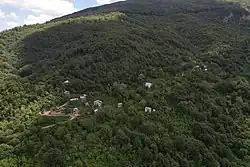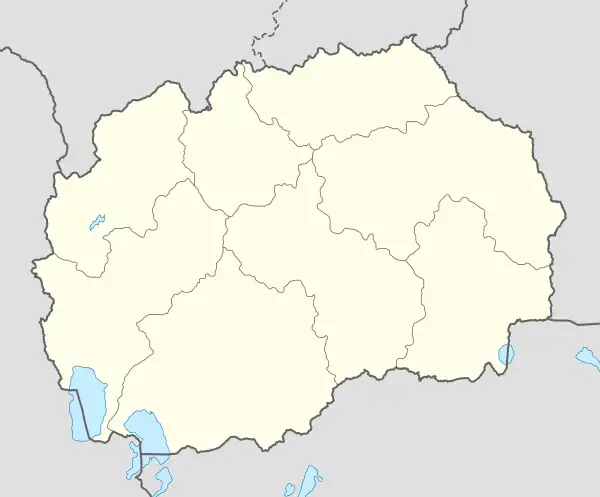Gorno Melničani | |
|---|---|
Village | |
| Горно Мелничани | |
 Airview of the village | |
 Gorno Melničani Location within North Macedonia | |
| Coordinates: 41°31′08″N 20°35′17″E / 41.51889°N 20.58806°E | |
| Country | |
| Region | |
| Municipality | |
| Population (2002) | |
| • Total | 0 |
| Time zone | UTC+1 (CET) |
| • Summer (DST) | UTC+2 (CEST) |
| Car plates | DB |
| Website | . |
Gorno Melničani (Macedonian: Горно Мелничани) is an uninhabited village in the municipality of Centar Župa, North Macedonia.
Demographics
Gorno Melničani (Gorna-Menliçani) is attested in the Ottoman defter of 1467 as a village in the ziamet of Reka which was under the authority of Karagöz Bey. The village had a total of six households and the anthroponymy attested depicts a mixed Albanian-Slavic character with instances of Slavicisation; as is depicted in the case of Andrija Zogovići, his surname being formed from the Albanian zog ("bird") and Slavic suffix -ići.[1]
According to the 1942 Albanian census, Gorno Melničani was inhabited by 193 Bulgarians.[2]
Gorno Melničani has traditionally been inhabited by an Orthodox Macedonian and Torbeš population.[3]
According to the 2002 census, the village had a total of 0 inhabitants.[4]
References
- ↑ Caka, Eduart (2019). Defteri i hollësishëm për zonat e dibrës i vitit 1467. Tiranë: Akademia e studimeve albanologjike instituti historisë. p. 117.
- ↑ http://pop-stat.mashke.org/alb-historic/1942-diber-tetove-ethnicrel-loc.htm
- ↑ Vidoeski, Božidar (1998). Dijalektite na makedonskiot jazik. Vol. 1. Makedonska akademija na naukite i umetnostite. ISBN 9789989649509. p. 326. "Население со мајчин јазик македонски живее во гр. Дебар (од двете конфесии), во селата: Присовјани, Локов, Збажди, Р’жаново, Буринец, Селци (православни) - во Малесија, Горно Косоврасти, Р’ковци, Кочишта, Мал и Голем Папрадник (муслимани), Долно Косоврасти, Мелничани, Броштица, Житинени, Горенци (од двете конфесии), Елевци, Рајчица, Пареши, Баниште (православни)."
- ↑ Macedonian Census (2002), Book 5 - Total population according to the Ethnic Affiliation, Mother Tongue and Religion, The State Statistical Office, Skopje, 2002, p. 188.